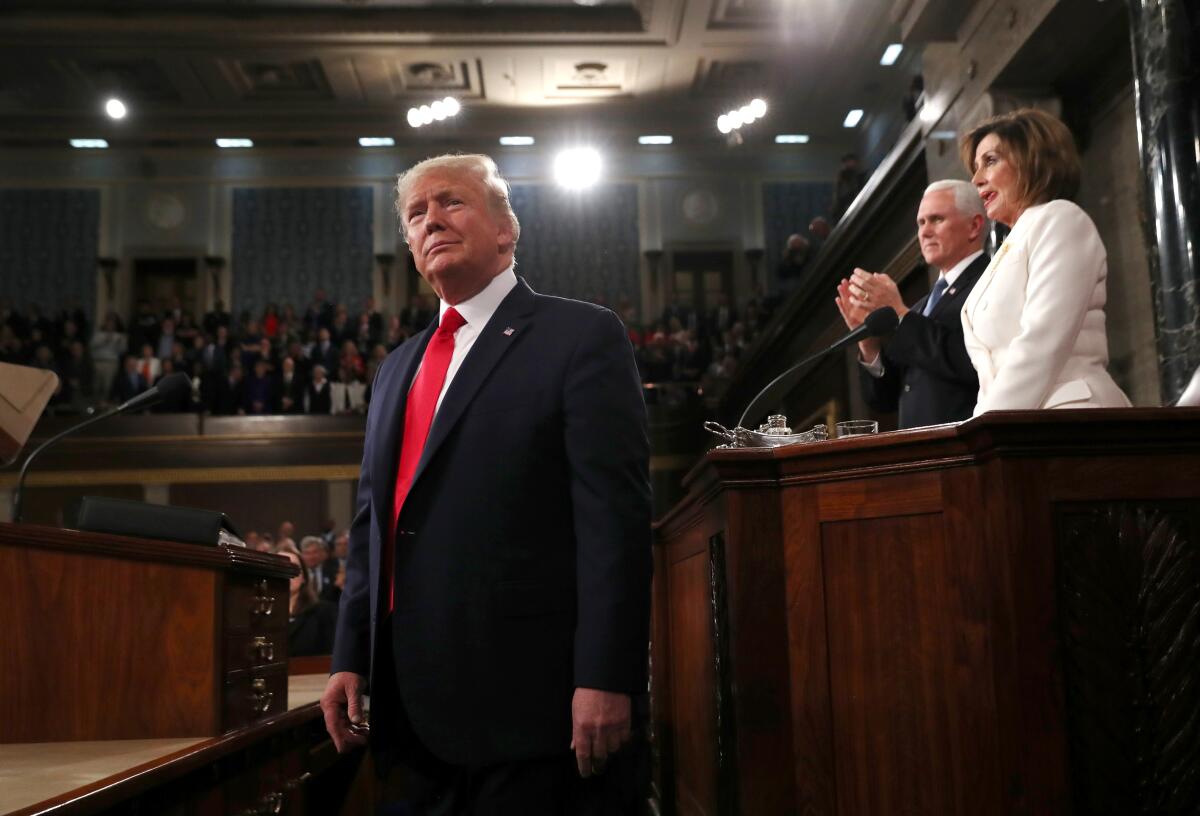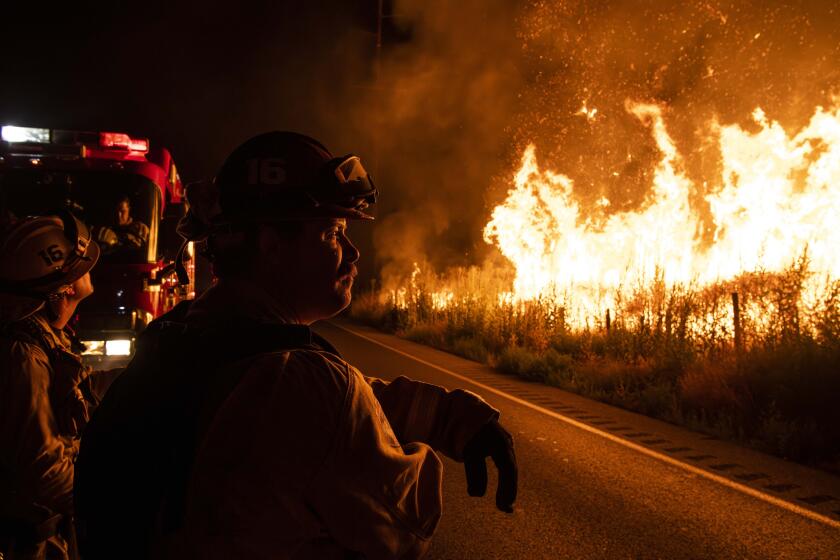Column: Californians will soon have to decide: Do they care more about ousting Trump or the issues?

- Share via
SACRAMENTO — President Trump’s highly partisan State of the Union address was a political rallying cry — for Democrats.
And it was especially timely for California Democrats because their presidential primary is rapidly approaching.
No doubt the president’s speech warmed the hearts of adoring Republicans. But its provocative content and delivery should have lit a fire under Democrats and inspired them to weigh carefully their choice of Trump’s opponent in the November election.
In the March 3 primary, do California Democrats vote for the candidate whose views on issues they strongly support — or the candidate with the best chance of booting Trump out of the Oval Office? The former would presumably be a firebrand liberal; the latter a pragmatic moderate.
But after the nominating race’s first lap in chaotic Iowa, who can really be sure which Democrat would be Trump’s strongest opponent?
The conventional wisdom had been that former Vice President Joe Biden would be the most electable Democrat. But he was badly beaten in Iowa by fellow moderate Pete Buttigieg, a former mayor of medium-size South Bend, Ind.
That’s assuming preliminary results from Iowa’s caucus debacle hold up.
Biden apparently finished a dismal fourth, which ordinarily would verge on being a candidacy disqualifier. He trailed — in order — Buttigieg, Vermont Sen. Bernie Sanders and Massachusetts Sen. Elizabeth Warren.
“Biden came out badly wounded,” says Bob Shrum, director of the Jesse M. Unruh Institute of Politics at USC and a former Democratic strategist. Given his earlier lead in the polls, Shrum asserts, “finishing fourth was extraordinary. People decided to look at someone else.”
That must have been Buttigieg.
“Biden’s going to have trouble raising money at this point,” Shrum says. “The argument that he’s the most electable candidate has been at least frayed.”
In California, likely voters were recently asked in a poll conducted by the UC Berkeley Institute of Governmental Studies which was more important: choosing a candidate with the best chance of beating Trump or one they most agreed with on the issues.
The results were close: 53% favored the most electable candidate and 47% wanted the one they agreed with the most.
But significantly, 82% of Biden’s supporters opted for the most electable. So did 73% of Minnesota Sen. Amy Klobuchar’s small cadre of fans, 72% of former New York Mayor Michael R. Bloomberg’s and 59% of Buttigieg’s.
The question is: Where do Biden’s supporters turn if they no longer think he’s a potential winner? To Bloomberg? Buttigieg? Maybe Klobuchar?
Warren’s backers were split almost evenly between those who cared most about winning and those passionate about issues. But 65% of Sanders’ followers were backing him because of his stands on issues.
Trump probably riled them in his speech by taking a shot at Sanders without mentioning his name. “We will never let socialism destroy American healthcare,” he declared.
Sanders calls himself a “democratic socialist” and wants a single-payer healthcare system that would be government-run and exclude private insurance.
Sanders was the clear California leader in the UC Berkeley IGS poll, supported by 26%, followed by Warren at 20% and Biden at 15%. No other candidate rose above a single digit. The survey was taken in late January.
The Iowa results could reshuffle that thinking — and possibly so could Trump’s contentious speech. He advocated tighter restrictions on abortions, pledged to protect gun ownership, denounced providing government medical insurance for “illegal aliens” and bragged about building the border wall — all counter to the California consensus.
The question California Democrats must ask themselves is how badly do they want to beat Trump in November.
Biden could bounce back in the New Hampshire primary on Tuesday, though polls have favored Sanders from neighboring Vermont.
Sanders is also leading in the next contest, the Nevada caucuses, because of strong Latino support.
Biden’s firewall has been the South Carolina primary because of strong support from African Americans. But that contest is only three days before California’s. So South Carolina’s impact on voters’ thinking in this state could be minimal. Many Californians probably will have already voted by mail.
If Biden’s political stock is plummeting and Sanders’ rising, “that’s an ideal scenario for Bloomberg,” Strum says.
The multibillionaire has already spent at least $35 million of his fortune on TV ads in California. He has forked out an unprecedented $300 million-plus nationally on TV spots in the March 3 Super Tuesday states.
Before Californians need to vote, they’ll know more about whether Buttigieg’s Iowa showing was a fluke or the sign of a rising star.
“I think he’s one of the more talented presidential candidates I’ve ever seen,” Shrum says. “He’s short on experience, but he’s long on brains, talent and the capacity to communicate. He speaks not just in complete sentences but in complete paragraphs. And he has the capacity to motivate people.”
Buttigieg’s weakness is lack of appeal to African Americans and Latinos. Iowa is roughly 90% white.
California is the nation’s most diverse state. And here, in the UC Berkeley poll, Sanders was winning Latino and black voters handily. Buttigieg was drawing in the low single digits.
“I think it’s going to end up being a Buttigieg-Sanders thing, with maybe some opportunity for Bloomberg,” says veteran Democratic strategist Bill Carrick. “Bloomberg’s going to be a player. He’s going to be all over TV.”
California Democrats will be voting while the nominating race is in full gallop. That’s a rarity.
More to Read
Sign up for Essential California
The most important California stories and recommendations in your inbox every morning.
You may occasionally receive promotional content from the Los Angeles Times.











